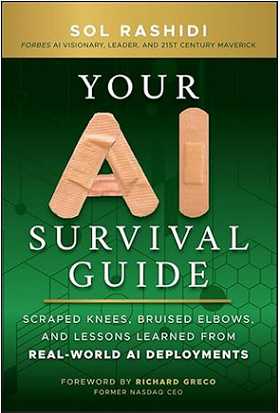Author: Sol Rashidi
Publisher: Wiley
Date: April 2024
Pages: 224
ISBN: 978-394272631
Print: 1394272634
Kindle: B0CYLXSVW5
Audience: General
Rating: 3.5
Reviewer: Kay Ewbank
This is a book aimed at executives and managers who work in companies that don't yet use AI, with the aim of providing information to them about what AI offers.
After a scene setting opening chapter, Sol Rashidi sets out her view on leadership and 'finding the rogue executive within you', saying that you must dare to be different to do this. In some ways, this opening salvo tells you everything you need to know about the feel of the book. Rashidi shares her story of her humble beginnings and how if she can do it, others can too.
Chapter 3 then goes on to discuss key principles about 'bending the rules while not breaking the spirit'. There's a lot of the sort of things you hear from motivational speakers - think big, start small and scale quickly, for instance.
Chapter 4 is rather more focused on AI, with descriptions of the steps of an AI deployment from the management viewpoint, with topics such as readiness assessments and use case selection. The 'preparing and designing' phase is still very much motivational management - the vision, the impacts, the approach, the process and the support.

The next chapter is titled 'the project killers: the wrong people'. It looks at a list of types of resistance that might be encountered - naysayers (who point out the problems in your plans), blind (think the project is just another shiny toy), curmudgeons (overly critical), data scientists (focused on how to achieve the solution rather than the business value), and know-it-alls (offer unsolicited advice) among others.The Human in the Loop is the title of the next chapter, and the summary says it is about avoiding any negative impressions of the project internally or externally. This chapter does make some good points about what needs to be in place to ensure AI-driven projects are responsibly created, including the need to have humans overseeing the output at some point.A chapter on the likely future impact and current impact of AI on every industry and function considers a number of sectors such as healthcare, retail, education; and functions such as legal, sales, finance and customer service. This is followed by a chapter on AI jargon and development that gives terms and definitions, and the book closes with a crystal-ball gazing exercise on what the future holds.I'm not a target reader for this book, nor is most of our regular audience. While the management spiel set my teeth on edge, it might be worth skim reading just so you know the sort of thing your pointy headed bosses are likely to be basing their ideas on. In fairness, Rashidi makes some interesting points, and her analyses of problems, personalities and solutions are obviously based on her own experience. I'm just not convinced this is an AI survival guide.
To be informed about new articles on I Programmer, sign up for our weekly newsletter, subscribe to the RSS feed and follow us on Twitter, Facebook or Linkedin.
Coding All-In-One For Dummies
Author: Chris Minnick
Publisher: For Dummies
Pages: 912
ISBN: 978-1119889564
Print: 1119889561
Kindle: B0B5BBNW9L
Audience: People wanting to learn to code in JavaScript, Flutter and Python
Rating: 3.5
Reviewer: Kay Ewbank
This book is described as offering an ideal starting place for learning th [ ... ]
|
Python Crash Course, 3rd Ed (No Starch Press)
Author: Eric Matthes
Publisher: No Starch Press
Pages: 552
ISBN: 978-1718502703
Print: 1718502702
Kindle: B09WJX22TV
Audience: People wanting to learn Python
Level: Introductory/Intermediate
Audience: Not the complete beginner
Rating: 4
Reviewer: Alex Armstrong
To reach a third edition this [ ... ]
| | More Reviews |
|

